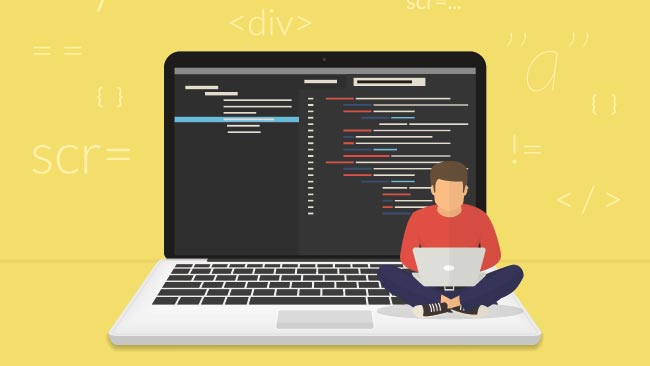6 must-have skills for young web developers
This expert advice for web developers will help give you that competitive edge.

Daily design news, reviews, how-tos and more, as picked by the editors.
You are now subscribed
Your newsletter sign-up was successful
Want to add more newsletters?

Five times a week
CreativeBloq
Your daily dose of creative inspiration: unmissable art, design and tech news, reviews, expert commentary and buying advice.

Once a week
By Design
The design newsletter from Creative Bloq, bringing you the latest news and inspiration from the worlds of graphic design, branding, typography and more.

Once a week
State of the Art
Our digital art newsletter is your go-to source for the latest news, trends, and inspiration from the worlds of art, illustration, 3D modelling, game design, animation, and beyond.

Seasonal (around events)
Brand Impact Awards
Make an impression. Sign up to learn more about this prestigious award scheme, which celebrates the best of branding.
While it can be difficult, or at least time-consuming, to develop hard skills from scratch, it’s certainly not as difficult to hone your skills (including those softer skills) to get a competitive edge. Learning can take many different forms, so aside from harnessing the latest and greatest web design tools, what can the web developers of tomorrow do to get ahead?
To get an idea, Packt asked six of its expert authors and developers what they think graduates and young developers can do to give themselves a head start. Here’s what they had to say:
01. Specialise, don’t diversify
Harold Dost, principal consultant at Raastech, suggests that young developers take some time to look at tools such as Lynda (now called LinkedIn Learning) or Linux Academy. He stresses that tools such as these can be used to develop a strong foundation of knowledge on a key topics and can help you on your journey in becoming an expert.
“Hone a core skill (maybe two or three), and then diversify on the rest,” says Dost. “This will allow you to specialise and give you the in-depth knowledge, which will be necessary as you go further in your career.”
But he also says that although you should specialise in a few areas, be careful not to neglect other opportunities. “At the same time as specialising,” Dost says, “be sure to keep learning about new technologies to allow you to grow and improve the work you produce.”
02. Read and write (more than just code)
Oracle ace director and principal at Capgemini UK, Luis Augusto Weir, says: “My advice for young developers would be to be passionate about learning and, of course, about coding.”
He also thinks that even though his industry is all about new technologies, good old fashioned reading will always be the most important part of education.
“Not only does a huge amount of effort go into writing books,” he says, “but nothing beats a good book to read whilst on the train, or bus. Bringing a book with you wherever you go means you’re always equipped to learn.”
Daily design news, reviews, how-tos and more, as picked by the editors.
Author Adrian Ward backed up Luis’ advice, saying that reading and writing were crucial to his own education. He says that writing, whether it's “blogs, articles, books or presentations” will compel you to learn. “If you’re writing about something,” he adds, “you certainly have to learn about it first!”
03. Take up meditation. No, really.

Perhaps the most frustrating thing about working in IT and tech is the non-stop nature of the industry. It’s easy for those just finding their feet in a constantly moving world to feel overwhelmed. Author Sten Vesterli says that the most critical skill to learn is “to manage your energy, and find ways to replenish it when it's running low."
If you have high energy, you can learn any skill and it will remain employable
Sten Vesterli
“If you have high energy,” he explains, “you can learn any skill and it will remain employable. If you have low energy, you will have a hard time learning something new and will be in danger of being left behind by technological changes.”
But how does Vesterli make sure that he’s energised enough to keep up to date with the pace of change? “I've found that meditation and triathlons work for me,” he says, “but others will have different things that give them energy.”
04. Question everything
Phil Wilkins, author and senior consultant at Capgemini, thinks that sometimes the tech industry is a bit quick to move onto the next fad. He says that as graduates gain experience, they should challenge the work they are doing and the tools they are using to make sure that they are always trying to influence things for the better. Not only will this help new developers stand out to their employers, but it will help them learn.
“Many will consider me a heretic, but the industry is sometimes a little quick with the next shiny thing and some 'not-invented-here' thinking," says Wilkins. "I think you should challenge those around you to really understand the tools they’re using, and question whether they’re the right tools to do the job well. Reflecting on what you’re doing and challenging yourself to do something better will drive better understanding and insight that can then be applied in later life.”
“Questioning why something is a good answer to a problem is as important as to how to answer the problem,” adds Wilkins. “Understanding this may not make you a guru, but it will give you a foundation to work with peers in an engaging manner and set you up for future success. Ultimately IT is here to solve problems, and knowing why certain things are good answers rather than that they simply are good answers, means you stand the best chance of developing good solutions.”
05. Get networking

It’s a frustrating stereotype that that tech types aren’t social beings. One tip suggested by Packt’s experts was to realise that putting yourself out into the real world is a great way to get ahead. As cliché as it is, networking is a simple way of getting a foot in the industry.
Whether you attend events organised by your university of college, or connect with people who interest you on LinkedIn, networking is a crucial skill – particularly if you ever consider going freelance. Ward says that aside from writing, he has one other crucial bits of advice for graduates: network. “Just get involved with the community,” he says. Not sure how? Read our advice on how to network.
06. Apply for the right jobs
Robert van Mölken, author and senior Integration and cloud specialist for AMIS, says that graduates seeking employment should actively look for companies that invest in their developers to keep them up to date with innovations.
Things are changing so fast these days that you can’t sit still if you want to be relevant in two years time
Robert van Mölken
“Things are changing so fast these days that you can’t sit still if you want to be relevant in two years time," he says. "Companies that allow their developers to go to conferences, both locally and further afield, will find that they will learn upcoming skills much faster, going beyond the point of knowledge you can get from investing in and learning from books.”
However, van Mölken also says that developers shouldn’t just rely on their bosses giving them opportunities – they should find them for themselves. “Invest some personal time to experiment with new technologies and IT innovations,” he advises. “Don’t fall behind on stuff just because you are comfortable with what you do every day at work. Find opportunities to speak up, to give presentation about what you learned, and share your experiences. Then you will get noticed, and a world of possibilities will open up to you.”
This article was originally published in January 2017.
Related articles:

The Creative Bloq team is made up of a group of art and design enthusiasts, and has changed and evolved since Creative Bloq began back in 2012. The current website team consists of eight full-time members of staff: Editor Georgia Coggan, Deputy Editor Rosie Hilder, Ecommerce Editor Beren Neale, Senior News Editor Daniel Piper, Editor, Digital Art and 3D Ian Dean, Tech Reviews Editor Erlingur Einarsson, Ecommerce Writer Beth Nicholls and Staff Writer Natalie Fear, as well as a roster of freelancers from around the world. The ImagineFX magazine team also pitch in, ensuring that content from leading digital art publication ImagineFX is represented on Creative Bloq.
